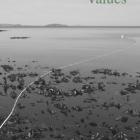Callicott, J. B., W. Grove-Fanning, J. Rowland, D. Baskind, R. H. French, and K. Walker. “Was Aldo Leopold a Pragmatist? Rescuing Leopold from the Imagination of Bryan Norton.” Environmental Values 18, no. 4 (2009): 453–86. doi: 10.3197/096327109X12532653285812. Republished by the Environment & Society Portal, Multimedia Library. http://www.environmentandsociety.org/node/7509.
Aldo Leopold was a pragmatist in the vernacular sense of the word. Bryan G. Norton claims that Leopold was also heavily influenced by American Pragmatism, a formal school of philosophy. As evidence, Norton offers Leopold’s misquotation of a definition of right (as truth) by political economist, A.T. Hadley, who was an admirer of the philosophy of William James. A search of Leopold’s digitised literary remains reveals no other evidence that Leopold was directly influenced by any actual American Pragmatist or by Pragmatism (although he may have been indirectly influenced by Pragmatism early in his career). A 1923 reference, by Leopold, to Hadley and Hadley’s putative definition of truth, cited by Norton, is dripping with irony. Leopold, as he matured philosophically, regarded a profound cultural shift from anthropocentric dominionism and consumerism to an evolutionary-ecological worldview and an associated non-anthropocentric ‘land ethic’ to be necessary for successful and sustainable conservation. Hadley espoused a brutal form of Social Darwinism and his philosophy, as expressed in the book of Hadley’s that Norton cites, is politically reactionary, militaristic and unconcerned with conservation. Leopold’s mature philosophy and Hadley’s—far from consonant, as Norton claims—are diametrically opposed.
— Text from The White Horse Press website
All rights reserved. © 2009 The White Horse Press


